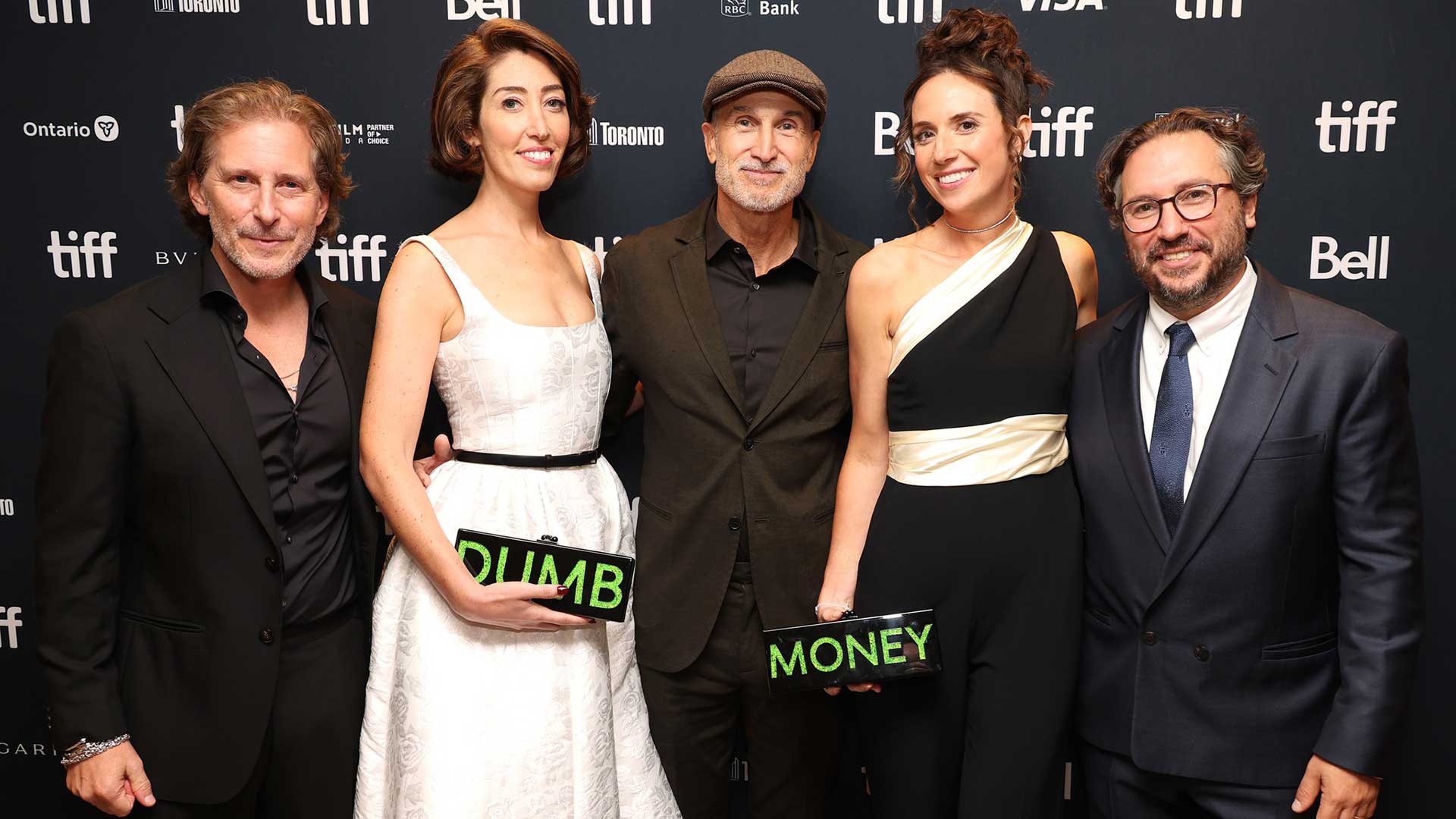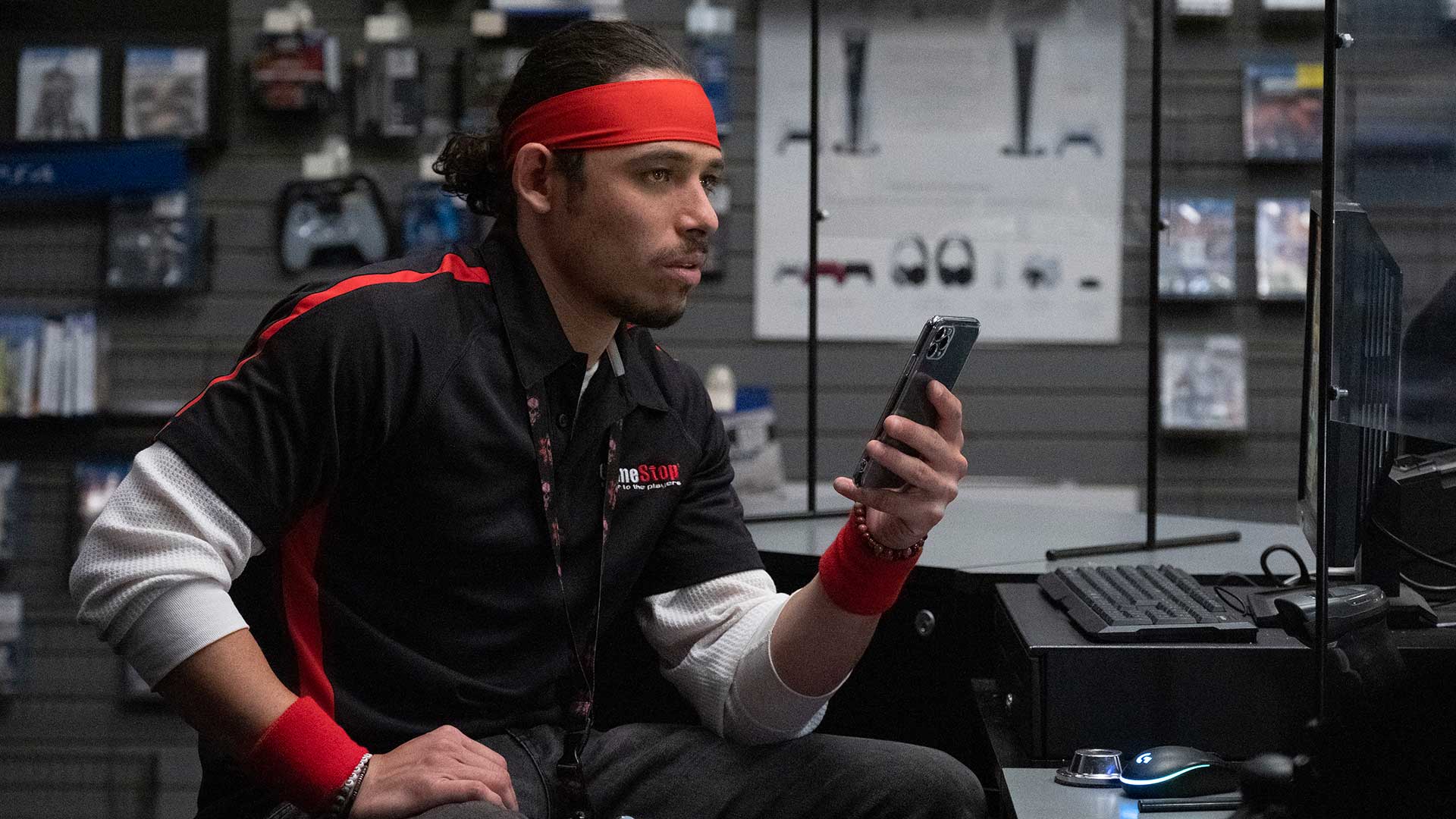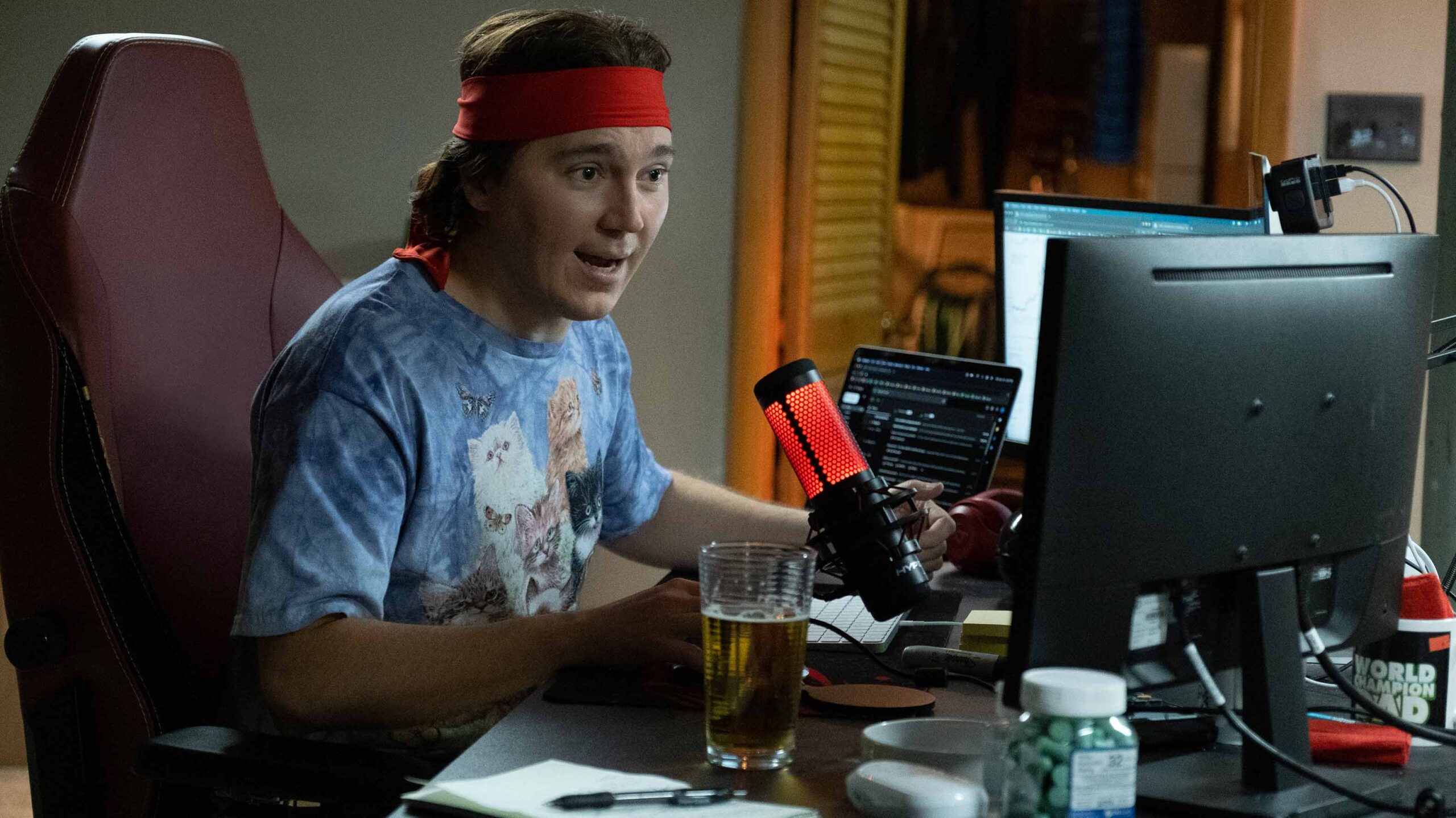
It’s hard to believe, but it’s been over two years since a bunch of Redditors took Wall Street by storm using GameStop stock.
In January 2021, the internet came together to rapidly increase the price of the video game retailer’s stock (in an event known as a “short squeeze,” leading the world over, especially the financial market, absolutely perplexed. Later that year, Ben Mezrich (whose The Accidental Billionaires was adapted into The Social Network) chronicled the whole ordeal in a new book called The Antisocial Network.
Naturally, such a wild story was also ripe for the cinematic treatment, and now, Sony Pictures has released a movie doing just that. Enter Dumb Money, the latest film from director Craig Gillespie (I, Tonya) follows Keith Gill (Paul Dano), the financial analyst who spearheaded the short squeeze through the subreddit r/wallstreetbets, and the everyday people that he inspired.
At this year’s Toronto International Film Festival (TIFF), MobileSyrup sat down with Lauren Schuker Blum and Rebecca Angelo, the writers and executive producers of Dumb Money. They talked about the process of breaking down the wild story for wider audiences, its overall timeliness and what they hope people take away from it.
Question: You both worked at The Wall Street Journal, so I’m sure some interest in the GameStop story just naturally came from that. But what drew you to adapting that into an actual movie?
Schuker Blum: We obviously followed the story and the headlines, but we didn’t get deeply into it until [producer] Aaron Ryder came [to us.]
Angelo: We were sort of slack-jawed watching it on television not really understanding what we were seeing.
Schuker Blum: “What is all this about GameStop?” And Aaron Ryder sent us 10 pages of the [Ben] Mezrich proposal [for The Antisocial Network], and we started researching it. And I think as soon as we started reading r/wallstreetbets, we realized it’s about so much more than Wall Street and money — it was actually about a movement.
Angelo: We talked about the movie really being about value and a value system of our country — of our world, really, not just the United States. Who determines value? Is it just the rich people? Is it the people who hold most of the power and wealth and information? Or is there a different and better way? And we really feel like this movement shows us one possible path, where people say, “Enough is enough, the inequality is too great, we have to change things.” And the best way to do that is to take back those levers of power and say, “No, we determine the value of work, of a movement, of a company, of a life.” And that’s what was so inspiring to us and what elevated it to us about the usual “story of the week” stuff that Hollywood tends to pounce on.
Schuker Blum: Those get submitted every single week. We also have a long-standing interest in internet populism, which we feel is one of the most powerful forces shaping our culture today. And it’s also one of the least cinematic, and we love that challenge. This felt like a movement that felt like it had a really positive message. It was also the rare populist movement that didn’t divide along left and right lines.
Angelo: Traditional American red and blue.

From left to right: Aaron Ryder, Rebecca Angelo, Craig Gillespie, Lauren Schuker Blum and Teddy Schwarzman at the TIFF Dumb Money premiere.
Schuker Blum: Yeah, you had like [U.S. representative] AOC [Alexandria Ocasio-Cortez] talking about Robinhood [the popular investing app that froze GameStop stocks amid the short squeeze] and the injustice of that, and you had [U.S. senator] Ted Cruz saying “I agree.” It was also a way into one of the most galling inequalities of our time, which is economic equality. It’s this feeling that the system is broken, whether it’s Wall Street or Hollywood. We even had that message hit home for us. We’re here as producers talking about the film, we’re also the writers of it, and we find ourselves proudly part of our guild fighting for the same need for transparency and fairness that the retail traders were fighting for on Wall Street. [Note: this interview took place prior to September 24th, when the Writer’s Guild of America reached a tentative deal to end its five-month strike.]
Q: A lot of the time, these kinds of “true story” movies come a few more years out from what actually happened. Dumb Money is only a little over two years later. Were there any concerns that perhaps this is “too soon” and maybe you’d want to revisit this down the line instead, especially since it is fundamentally a pandemic story and those wounds are maybe still a little fresh?
Angelo: Totally. I think when we look at a story and think about whether it’s a story that we want to tell, we look for qualities that are both timely and timeless, and we really found those very quickly in this story. There’s an urgency to this movement because we see it unfolding. These guys were, in many senses, first, but we now see it in every industry. People have lost faith in our systems, in our financial system. We have lost faith in the structure of our entertainment system, which is why we are mounting this collective action.
But people have lost faith in government systems, these institutions are letting people down. And so the being able to dramatize this movement, which says so much about why we are where we are right now, we felt that was urgent, and we worked our asses off to do it quickly. We also feel like there’s a core human story here and an essential “David versus Goliath” story that is timeless. So our great hope — and you guys will be the judge if we pulled it off — is that yes, we came fast, and yes, there will be more processed pieces with more of a long view down the line, but that this piece both stands as a work of art that tells us something about who we are and where we are right now, and then also says something that will last and you could watch it 100 years from now and understand and relate to the characters as human beings.
Schuker Blum: Right. Yes, it’s a story about the GameStop movement about a stock, but it’s about something much bigger, which also is our need right now for collective action and this widespread desperation to be part of something. You see that now with the Taylor Swift tour — people are desperate.
Angelo: Or Barbenheimer!
Schuker Blum: Yeah. And you can’t really put a price tag on that. You go on r/wallstreetbets and interview people who bought the stocks and they’d say stuff like, “I don’t care if I lose my whole paycheck from this year, I want to stick it to Wall Street — this is more important than just the money, I don’t care what happens to the stock. I’m done doing diamond hands and not selling.”
And this was an example of that. And we found this concept of collective effervescence, which was coined by Émile Durkheim, this French philosopher, which basically posits that when you do something with a group in proximity, whether it’s like in a chat room online, or at a concert, you actually generate electricity that lifts everyone up. And this really is an example. It’s even what happens when you go to the movies in a packed theatre — you feel something being with other people. And so to us, this movie was about kind of the positive that can come from that. It’s a small, recent example, but it’s happening everywhere.

Anthony Ramos (In the Heights) as a GameStop employee.
Angelo: And we really want viewing the movie — going to the theatre and watching this — to be another experience of collective effervescence. We want people to feel that it’s not just a movie, that it’s a movement, and that by coming and seeing it, you’re a part of something bigger.
Schuker Blum: That said, the story is continuing in new ways. You hear about “meme stocks” all the time. We just had the giant AMC [stock] kerfuffle. And so the story is not over. But we built it like a sports movie, and that hearing at the end is like the final championship game where he fights off and you have our protagonist triumphant, and Keith Gill giving that rousing speech. So we sort of found an ending for this story, but of course, the larger one is still continuing.
Q: I have friends who fancy themselves savvy about Wall Street, but they’re really not. In general, I think that speaks to how a lot of people probably aren’t really knowledgeable about this kind of thing. When you approached this movie, how did you balance incorporating the necessary “investor” side of things with making it more digestible and approachable for everyday viewers?
Angelo: We spent more time talking about that than anything else!
Schuker Blum: But I love how you asked that because I think one of the things we found writing this movie… We worked at The Wall Street Journal for many years — we covered earnings and we know how to research things, which we did. We got to do interviews. But there are so many parts of the Wall Street part of this that, first of all, were surprising. Like, the DTCC [Depository Trust & Clearing Corporation, which provides clearing and settlement services for financial markets] is actually not a government body.
Angelo: It sounds like it should be. “What is the DTCC? Oh, it’s a subsidiary of the NSCC. Okay!”
Schuker Blum: Wall Street has made itself deliberately opaque — no one understands all of it. As Keith Gill says in his speech, the people who run it don’t understand all the mechanisms of how this works. And that’s a way of containing all of the power and consolidating it among the one percent.

Nick Offerman (Parks and Recreation) and Vancouver’s own Seth Rogen (Pam & Tommy) play two of Dumb Money’s one-percenters.
Angelo: There’s a tradition of finance films in Hollywood — and we admire those movies and have studied them — but they’re often told from the top down, they’re told about genius managers or genius criminals. They’re told from that world. But this is a populist movie. This is a movie about David and Goliath, and it was really important to us that the movie lives in the world of the retail traders, the regular people and so the movie should never talk down to people. And it was part of why at the script level, we made the decision to incorporate so many of those authentic voices on TikTok. Those are all real TikToks — real people who participated in the movement and the way a lot of people learned about this was from each other. You go on TikTok and there are college kids explaining what a short is and what a short squeeze is. And it felt like the most organic way to tell the story was not to have Margot Robbie in a bathtub — as clever a device as that was for The Big Short — but really to have people on the ground explaining it to each other, explaining it to the audience the way they explained it to each show.
Schuker Blum: Also, it was like a cinematic movement. Watch these TikToks, here’s a squeeze and a chalkboard expanding it. So the easiest way to do this was actually to bring that cinema into the movie, and to give those people the big screen treatment that they deserve.
Q: Of course, when you’re approaching this movie, you read the book beforehand. But other than that, how deep of a dive did you take into the world of Reddit? Because that’s sort of a whole rabbit hole in and of itself.
Angelo: We are down it!
Schuker Blum: We read literally everything there is to read.
Angelo: We watched all of Keith’s videos, but also read the responses and reached out to some of those people and interviewed them and got to know them. It was important to us. Ben’s book is so terrific and he does such a good job of probing the characters that he depicts. But we also wanted to be on that, meet our own folks who participated in that to understand what brought them into it, especially the people who are like your friends who fancy themselves masters of the market and people who maybe bought a stock for the first time because of this or downloaded the Robinhood app and what about it hooked into them their own personal experience and made them care.

One of the everyday investors depicted in the film is a single mother nurse played by America Ferrera (Ugly Betty).
Schuker Blum: We were also struck by the diversity of people who were brought into this movement. There are people like your friends, but there’s also the mom of three at preschool who’s talking about this.
Angelo: Or grandparents.
Schuker Blum: Truck drivers… Once we realized that, we really wanted to approach this as an ensemble and bring in many different voices and have it really feel like a movement when you watch it. Not to focus on one singular character at the exclusion of others, because it really was this widespread, surprising thing that touched so many different people.
Q: When movies are made based on true events, facts inevitably get changed in the process. What’s interesting in your case, though, is you have two kinds of sensibilities. You worked as reporters where you have to purely report the facts, even if they’re not necessarily “entertaining.” But as screenwriters/producers, you want to entertain people. How did you balance making sure there was accuracy with maybe including a few less factual things that were more for fun?
Schuker Blum: That’s a great question. It’s also the central battle of our writing process. We’re always like, “okay, it has to be a movie, but it has to be right.” That’s always important.
Angelo: Our basic philosophy, where we’ve netted out on this, is that we don’t make up anything that we don’t have to. So we start by understanding, gathering as much information as we possibly can for our reporting, getting the facts down as best we can, and then turning that story into a movie. So imagining behind-the-scenes conversations that were happening in people’s homes, we don’t necessarily have access to that, and so we have to build out characters that are dimensional and see their interiority in a way that you can’t read on an internet forum necessarily.
Schuker Blum: For us as screenwriters, everything comes from character. Even our funny nude scene at the end comes from character. So that has to guide the writing process, and we wanted this film to feel like an emotional ride, that it felt like we were actually part of that part of it. We always laugh in journalism, you have that “to be sure” graph — a little footnote. Like, “Not every hedge fund lost money on this.” You can’t have that in a movie. You have to allow the audience to go through the ups and downs, so that’s what we had to sometimes — simplify things so that you can enjoy the emotional experience.
Angelo: Play a little bit with time, linger in certain moments that might have happened faster, but spend more time in them in the movie for dramatic effect. I’ll say also, Kevin Gill [Keith Gill’s brother] is, as far as we know, a perfectly ethical DoorDasher. He’s a super funny guy, but I don’t think he’s eating anybody’s food. That was really written explicitly for Pete Davidson, who probably would eat people’s food while smoking.
[everyone laughs]
Q: You talked about the David and Goliath story and the need for collective action. What are you hoping the average person who watches this movie takes away from it, and to the point of collective action, does in response?
Angelo: We think of the story that we depict in this movie as a little spark, and as a little spark, it’s easy to extinguish or it can become a giant flame. We’re excited at this moment because we are involved in our own collective action — we’re so hoping that we can find that our union leadership is able to finally achieve a reset in Hollywood because things are so profoundly broken.
I think there is so much inspiration to be taken from what people can do when they come together with a charismatic leader who is able to take that energy and point it in the right direction, for the most part, and movements are always messy. But I think we want people to leave the theatre just a little bit more optimistic than they are pessimistic — feeling like there is still hope to change things, as broken as they may be.
Schuker Blum: And that a leader can look like Keith Gill. You can be someone who doesn’t care about fame and fortune.
Q: And wearing a cat t-shirt!
Schuker Blum: [laughs] Yeah, right! Not all superheroes wear capes! We laugh that the closest thing to his superhero cape is his red headband. But yeah, you can be someone who leads through action, not words.
Angelo: And conviction and passion.
Schuker Blum: There’s a real lesson in value investing — look at Warren Buffet. There’s value in holding onto your convictions and having your beliefs and doing things for the right reasons and not to get rich or famous.
Dumb Money is now playing in select theatres ahead of a wide release on September 29th.
Image credit: Sony Pictures
MobileSyrup may earn a commission from purchases made via our links, which helps fund the journalism we provide free on our website. These links do not influence our editorial content. Support us here.



